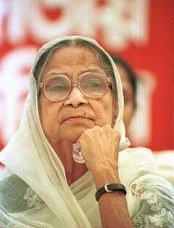 W
WAmanullah Mohammad Asaduzzaman was a student activist whose death at the hands of police during a protest on 20 January 1969 "changed the nature of the student-mass movement and ... turned into a mass-upsurge against the Ayub regime and its repressive measures", according to Banglapedia. The Daily Star reports him as one of three martyrs of the 1969 uprising in East Pakistan which "set the stage for the liberation war". He was awarded the Independence Day Award in 2018 posthumously by the Government of Bangladesh.
 W
WSir Surendranath Banerjee was one of the earliest Indian political leaders during the British Rule. He founded a nationalist organization called the Indian National Association, through which he led two sessions of the Indian National Conference in 1883 and 1885, along with Anandamohan Bose. Banerjee later became a senior member of the Indian National Congress. Surendranath repudiated Montagu–Chelmsford Reforms, unlike Congress, and with many liberal leaders he left Congress and founded a new organisation named Indian National Liberation Federation in 1919. He was one of the founding members of the Indian National Congress.He is given the epithet of Rashtraguru.
 W
WWomesh Chunder Bonnerjee was an Indian barrister. He was the co-founder and first president of Indian National Congress.
 W
WSuhasini Ganguly was an Indian woman freedom fighter who participated in the Indian independence movement.
 W
WBegum Sufia Kamal was a Bangladeshi poet and political activist. She took part in the Bengali nationalist movement of the 1950s and civil society leader in independent Bangladesh. She died in 1999 and was the first woman to be given a state funeral in Bangladesh.
 W
WSyama Prasad Mukherjee was an Indian politician, barrister and academician, who served as the Minister for Industry and Supply in Prime Minister Jawaharlal Nehru's cabinet. After falling out with Nehru, protesting against the Nehru-Liaquat Pact, Mukherjee resigned from Nehru's cabinet. With the help of the Rashtriya Swayamsevak Sangh, he founded the Bharatiya Jana Sangh, the predecessor to the Bharatiya Janata Party, in 1951.
 W
WMala Sen was a Bengali-Indian-British writer and human rights activist. As an activist, she was known for her civil rights activism and race relations work in London during the 1960s and 1970s, as part of the British Asian and British Black Panthers movements, and later her women's rights activism in India. As a writer, she was known for her book India's Bandit Queen: The True Story of Phoolan Devi, which led to the acclaimed 1994 film Bandit Queen. After researching the oppression of women in rural India, she also published Death by Fire in 2001.
 W
WPritilata Waddedar was a Bengali revolutionary nationalist from the Indian subcontinent who was influential in the Indian independence movement. After completing her education in Chittagong and Dhaka, she attended Bethune College in Kolkata. She graduated in philosophy with distinction and became a school teacher.